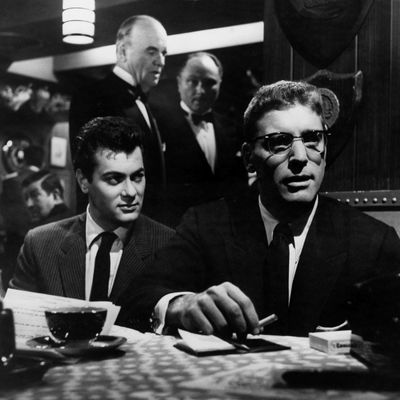
Every week for the foreseeable future, Vulture will be selecting one film to watch as part of our Friday Night Movie Club. This week’s selection comes from New York’s city editor, Christopher Bonanos, who will begin his screening of Sweet Smell of Success on January 29 at 7 p.m. ET. Head to Vulture’s Twitter to catch his live commentary, and look ahead to next week’s movie here.
Sweet Smell of Success, released in 1957, shows its age only on its gleaming surface. Its New York, of jazzy midtown nightclubs trawled by newspaper columnists fishing for gossip, is of course a thing of the past. (And man oh man, those crowded bars and clubs look mouthwatering right now.) But get one millimeter below that black-and-white shell, and it is just an incredibly contemporary movie. It’s about media power and the brutally transactional form it can take, and the ways in which people are allowed into the inner circle thereof (or not), and the way a reputation can turn on a few sentences.
Burt Lancaster plays J.J. Hunsecker, the columnist at the center of this world, as a man of imperial manner, one whose icy façade breaks only when he has to deploy some firepower in revenge. Then he seethes. You probably know the most quotable lines in the movie, and most of them are Hunsecker’s: His lordly moment with Sidney Falco, the scheming publicity man played by Tony Curtis, comes when Hunsecker holds up a cigarette and, without looking to his side, says “Match me, Sidney.” (Sidney doesn’t hop to it and give him a light—till later.) And then, later, to Sidney again: “I’d hate to take a bite out of you. You’re a cookie full of arsenic.” Even his delivery of the last word — it comes out awsenic — has just the right proportions of aristocratic hauteur and tough-guy smackdown.
What is a little hard to grasp, at this distance, is just how much power a columnist like J.J. would have had. As has been noted many times before, Hunsecker is a fictionalized version of Walter Winchell, a columnist of absolutely immense reach and intense vengefulness. It’s frankly amazing that his name is a sort of dusty antique today. It’s as if, 50 years from now, most educated people were not quite able to place the name “Rupert Murdoch.”
Winchell’s column was the mass-market draw for nearly 2,000 papers around the country. Even after radio had crested and then television had begun to eat into print’s dominance, the newspaper universe of 1957 was immense. New York, that year, had seven daily general-interest papers. Four came out every morning (the Times and the Daily News, plus their direct competitors, the Herald Tribune and the Daily Mirror); three others were published in the afternoon, containing news that had happened overnight and that day. You read one paper on the way to work, and a different one on the ride home or after dinner. (Afternoon papers are virtually extinct now, killed off by car culture and the 6 o’clock local news. A rare survivor is the New York Post, which switched to mornings in the 1970s.) That doesn’t even count the dozens of other papers, from The Wall Street Journal to the Communist Daily Worker, all of which had large and reliable readerships. The Jewish Daily Forward, published in Yiddish, had a six-figure circulation, hard to imagine today.
Your corner New York newsstand had just a sea of options, each pile held down with a cast-iron logo paperweight, and all but the Times and the Trib had gossip pages. (The Trib kind of did, actually, in Hy Gardner’s Broadway column; the Times, of course, would never.) The columnists and their columns all had personalities — Leonard Lyons amiable, Earl Wilson upright and evenhanded, Hedda Hopper the mean-girl correspondent from Hollywood. And then there was Winchell, who stood alone. He had basically invented the form, and because he got there first and had run flat-out and ruthlessly ever since, his was vastly bigger than the rest. Then he went into radio, and got even bigger, and then TV. He had a weird distinctive argot (a couple having a baby were sometimes “infanticipating”) and a custom of running together short items with ellipses that lingers today on “Page Six.” His machine-gun reading speed at the microphone helped to define his public persona. (He would unbutton his pants when he sat down at the mic, allowing him to breathe freely so he could talk faster. Try that on your podcast, folks.) In 1940, there were about 83 million adults living in America, and Walter Winchell claimed an audience — print and radio combined — of 50 million. Maybe it was true.
And a two-sentence putdown from him really could leave people fired or disgraced or divorced, particularly if he accused someone of being a Commie, which he was not afraid to do whether it was true or not. Conversely, an ebullient word about a restaurant or a Broadway show would put cash in the bank. Early on, Winchell had the ear of President Roosevelt, then broke with him. After the war, Winchell’s politics headed further and further to the right, eventually turning him into a full-on Red-baiting McCarthyite. That was where his power began to ebb: As the McCarthy era ended and its adherents were disgraced, Winchell lost a lot of his clout, and news outlets across the country began to drop his column and the TV and radio shows wound down. He had become a joke, and when the Daily Mirror — his home paper — shut down in 1963, the last support beam was kicked out from beneath him. He died in 1972, having outlived four of those seven dailies, torched his reputation, divorced once and left a series of women after that, and buried a ruined son who had taken his own life. An often-told anecdote notes that there was only one mourner at his funeral: his daughter, Walda, whose very name conveys his titanic ego. Neal Gabler’s epic biography of Winchell disproves this story — Winchell’s inner circle had planned to attend, but Walda kept them away — but it is almost surely true that had he died a decade earlier, his funeral would have been an immense event. Instead, he left this world nearly alone.
Walda, in fact, had had a fraught relationship with her father. At his peak, Winchell had squared off against a young suitor of hers, a Broadway producer named Bill Cahn. He eventually browbeat Cahn into leaving her, but that hadn’t been enough; he then carried out a vendetta for years, going so far as to get Cahn arrested (baselessly) for pimping. That didn’t work, but a half-trumped-up tax-evasion charge did, and Cahn ended up in jail. After doing his time, Cahn left the country altogether to get away from the persecution.
Which brings us to Hunsecker. In the fictionalized version of the Winchell-and-Cahn story that Ernest Lehman worked into his 1950 novella Sweet Smell of Success, the columnist exerts his power not over his daughter but instead his young naïve sister. He’s obsessed with her purity, upping the creepiness quotient even further than in real life (Winchell, apparently, was more concerned that Cahn was after Walda’s inheritance). When he wrote the book, Lehman was not hugely successful as a writer, and didn’t have much to lose — Winchell brushed off the book.
But by the time the movie was made, seven years later, Lehman had built himself a career as a screenwriter, mostly as an adapter of other work. (The King and I, North by Northwest, and later on The Sound of Music and Who’s Afraid of Virginia Woolf? were his scripts.) He was nervous about the movie, thinking that Winchell might rain down fire on him. But the combination of Winchell’s waning power and the movie’s disappointing commercial performance managed to stave off his ruination. And a funny thing happened: Instead of sticking to Lehman, the movie instead clung to Winchell. Today, the most powerful media figure of his day is barely remembered, and when he is, it’s almost always in essays like this. Just as Citizen Kane eventually became the way we learn about William Randolph Hearst, Sweet Smell of Success is, improbably, the one sense a lot have of Walter Winchell. The movie, not the scheming press agent, was the thing that was full of arsenic.
Sweet Smell of Success is available to rent on Prime Video and iTunes.
More From This Series
- Helen Hunt Answers Every Question We Have About Twister
- Mr. and Mrs. Smith Is a Straight Shot of Movie Star Charisma
- The Timeless Honesty of Wild Style, the First Hip-Hop Movie


